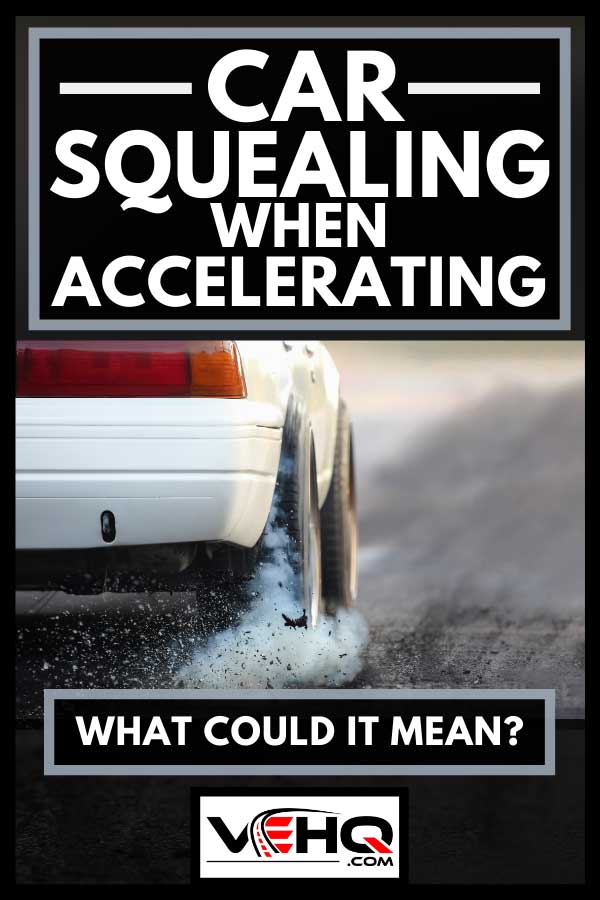 If your car squeals every time you tap the gas pedal, then it’s time to get in touch with a professional mechanic. Often, this squeaky sound signals a serious issue with your car. But what could be causing it? We did the research to give you the answer.
If your car squeals every time you tap the gas pedal, then it’s time to get in touch with a professional mechanic. Often, this squeaky sound signals a serious issue with your car. But what could be causing it? We did the research to give you the answer.
Typically, a squealing noise during acceleration is related to a problem with your car’s serpentine belt or V-belt system. The most common issues include:
- Belt pulley misalignment
- Loose or cracked belts
- Excessive belt tension
In this post, we’ll help you better understand why the serpentine belt sometimes squeals. We will also go over just how serious this issue is and what you could do to address the situation. Just keep reading!
Please remember that no online advice can ever replace proper diagnostics by your mechanic! A malfunctioning car is dangerous. Learn what you can online but always defer to your mechanic's advice.
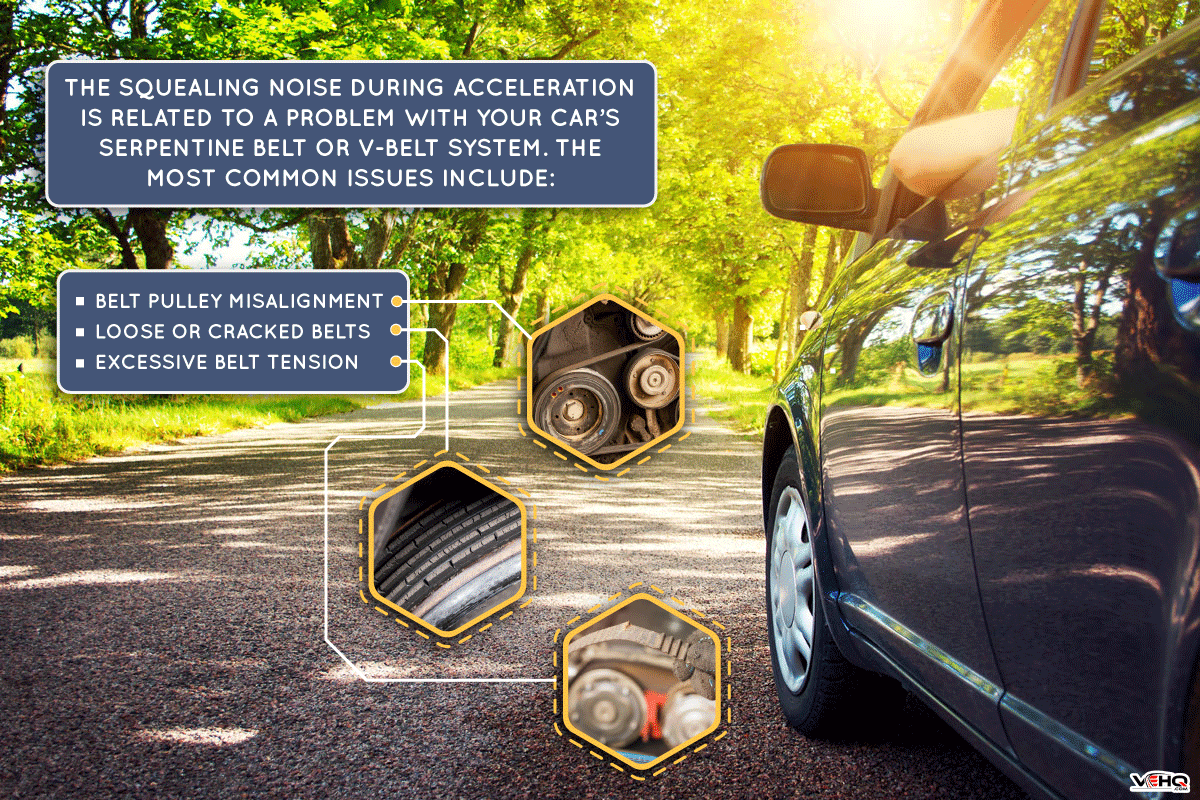
Serpentine Belt Basics
As we mentioned in the intro, most squealing sounds have something to do with the serpentine belt. In this first section, we’ll take a closer look at the functions of the serpentine belt and what you should (and shouldn’t) do once you notice a squealing noise.
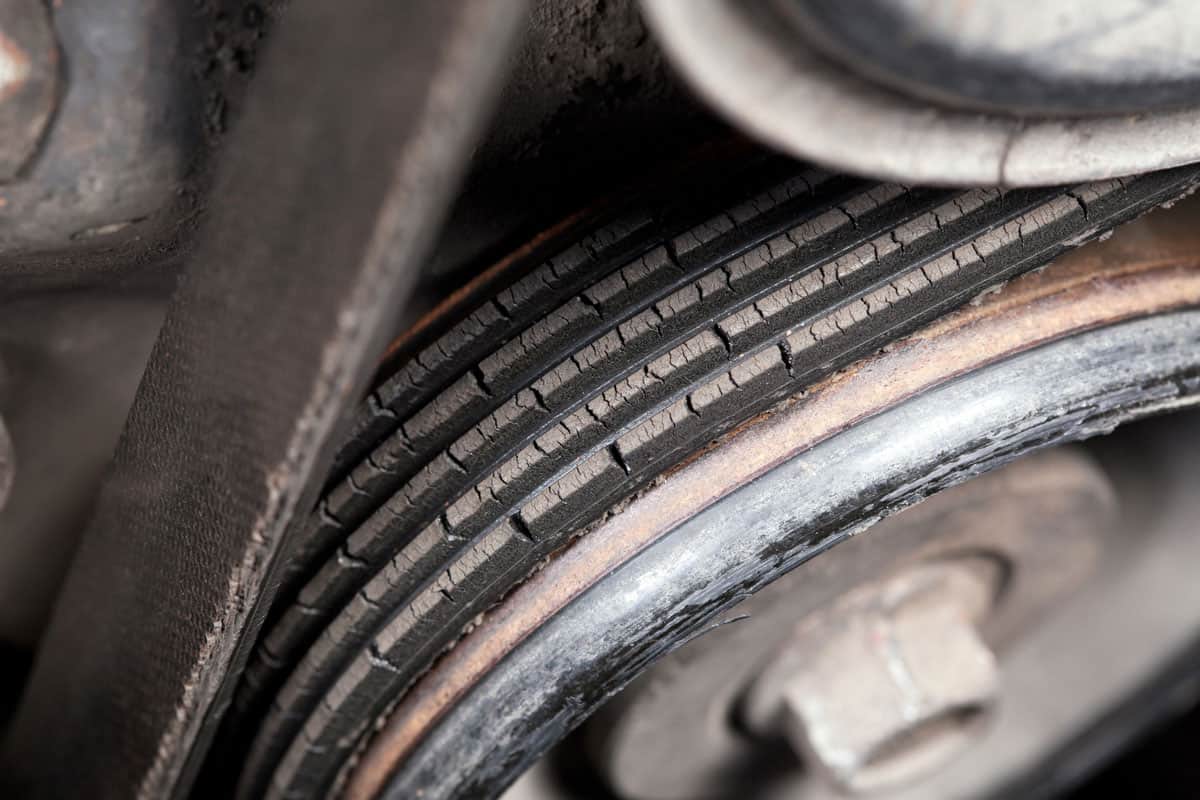
What Are Serpentine And V-Belts?
Since serpentine belt issues often cause squealing sounds, it’s essential to have a basic understanding of what this belt does. Basically, a serpentine belt is a rubbery, snake-like “band” that connects to many car accessories under the hood. The most important accessories serpentine belts help power include the alternator, air conditioning unit, water pump, and power steering pump.
While most cars nowadays use one continuous serpentine belt, older car models might have V-belts. These belts serve the same purpose as a serpentine belt, but, as you could already tell, there’s more than one of them. Each V-belt powers one of the accessories listed above.
For a long time, serpentine belts and V-belts were made with a rubbery substance known as neoprene. Most modern vehicles, however, only use serpentine belts made with a material known as ethylene propylene diene monomer (EPDM).
Manufacturers switched to EPDM because it’s more resistant to intense heat and harsh chemicals. We strongly suggest using or upgrading to EPDM belts if you haven’t already.
If you’re looking for a high-quality EPDM serpentine belt, then check out this one on Amazon:
Why Do Serpentine Belts Squeal?
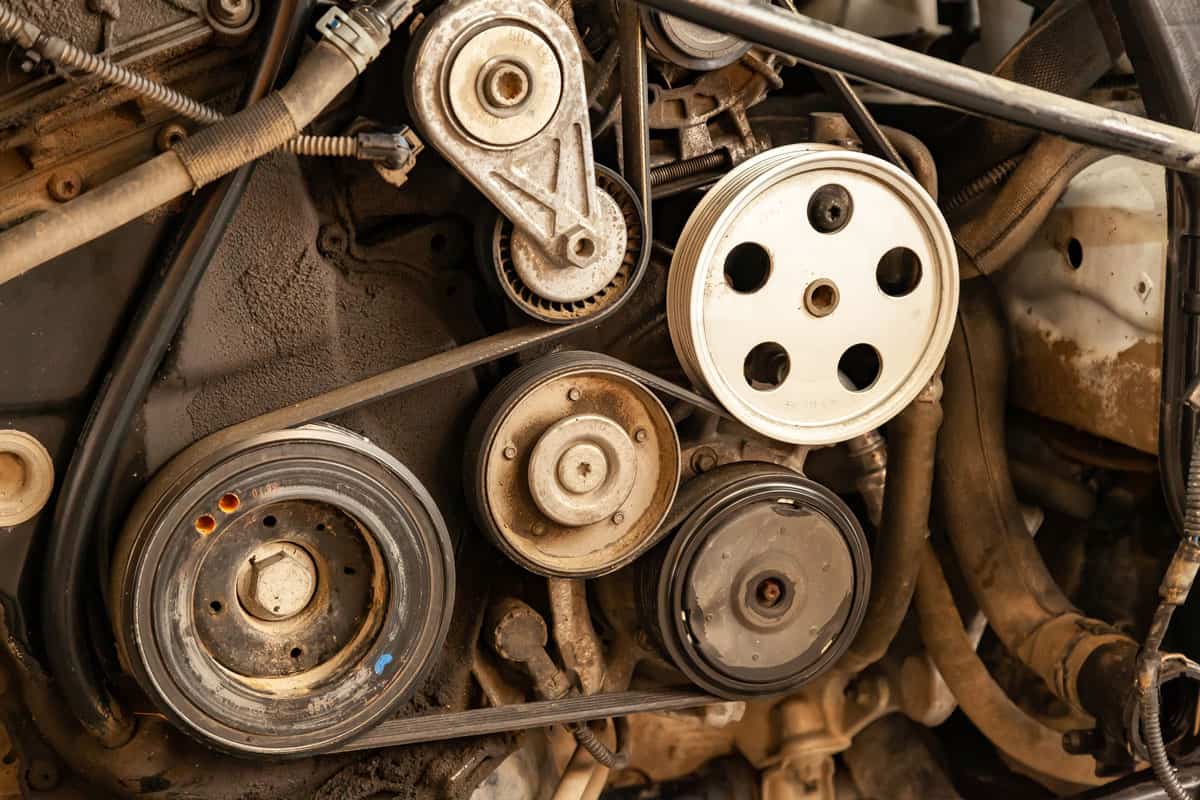
Now we know what a serpentine belt does…but why does it squeal? Well, there are several possible explanations, so it’s important to bring your car to a trained mechanic for a thorough diagnostic. Below, we’ll share just a few of the more common reasons serpentine belts start to squeal:
- The belt isn’t properly aligned on the pulleys
- The pulleys are broken or bent
- The belt is either too loose or too tight
- Moisture could be spilling onto the belt (e.g., a coolant leak)
- The grooves on the belt could be too deep
- The belt might be worn from excessive use
What Are The Signs Of A Bad Fan Belt?
Of course, a squealing sound is the most obvious warning sign you have a bad fan belt. But since the serpentine belt drives the fan, there are many other non-squeal-related warning signs your car’s serpentine belt is having some issues.
Remember, the serpentine belt drives power to many of the car’s accessories. So, if you notice any of these systems acting up, it could signal a serpentine belt issue.
For instance, many people first learn of a serpentine belt problem when they notice their air conditioning acting up. You might also have issues with your car overheating before hearing a squealing noise.
Read more: Car Overheating When Idling - What Could Be The Matter? [And How To Fix It]
It’s also important to remember the serpentine belt is attached to the alternator. This means you might see a “check battery” or “check engine” light flashing due to a serpentine belt problem.
Is It Safe To Drive With A Squealing Belt?
No, you shouldn’t drive a car with a squealing belt. A bad serpentine belt can put you in a hazardous scenario. Trust us when we say that you don’t want to be on the highway if you suddenly lose power steering or your car starts overheating. Not only are these scenarios life-threatening, but they could also put a damper on your finances (e.g., if you’re forced to call a tow truck).
While you might “get away” with a bum serpentine belt for a few days, mechanics never recommend it. To be on the safe side, bring in your car for a belt inspection as soon as you hear a squealing sound.
Serpentine Belt Maintenance And Repair
Now that you know why serpentine belts squeal, it’s time to learn a bit more about how to fix it. Below, we’ll detail everything you need to know about proper serpentine belt maintenance and repair.
How Long Does A Serpentine Belt Last?
The typical lifespan of a serpentine belt is between 60,000 – 90,000 miles. Belts that are made with EDPM usually last between 70,000 – 90,000 miles, but those made with neoprene have a lifespan of 50,000 – 60,000 miles.
While we’re on the subject, it’s worth pointing out how long the accessories attached to the serpentine belt tend to last. Indeed, many people who get their serpentine belt replaced opt to get a few of their accessories replaced during the same visit.
Here’s a quick list of lifespans associated with a few significant accessories:
- Power steering pumps: 60,000 – 90,000 miles
- Tensioners: 40,000 – 70,000 miles
- AC compressors: 8 – 10 years
- Water pumps: 60,000 – 90,000 miles
How Much Does It Cost To Fix A Squeaky Belt?

Prices for a serpentine belt replacement vary depending on various factors, including your car model and the extent of the damage. If you’re looking for a ballpark figure, however, expect a serpentine belt replacement to be in the $150 range. The labor is usually set between $70 – $90, and most serpentine belts cost $20 – $50.
Sometimes mechanics will ask if you want to include any other accessory replacements on top of the serpentine belt service. Even if there’s no issue with any of these components, it might be a good idea to replace them if they are getting old.
Here’s a rough idea of how much you will pay to replace some of the parts the serpentine belt comes into contact with:
- Water pump: $450 – $600
- Tensioner: $250
- Power steering pump: $500 – $750
- AC compressor: $750 – $1,000
How To Check Your Serpentine Belt
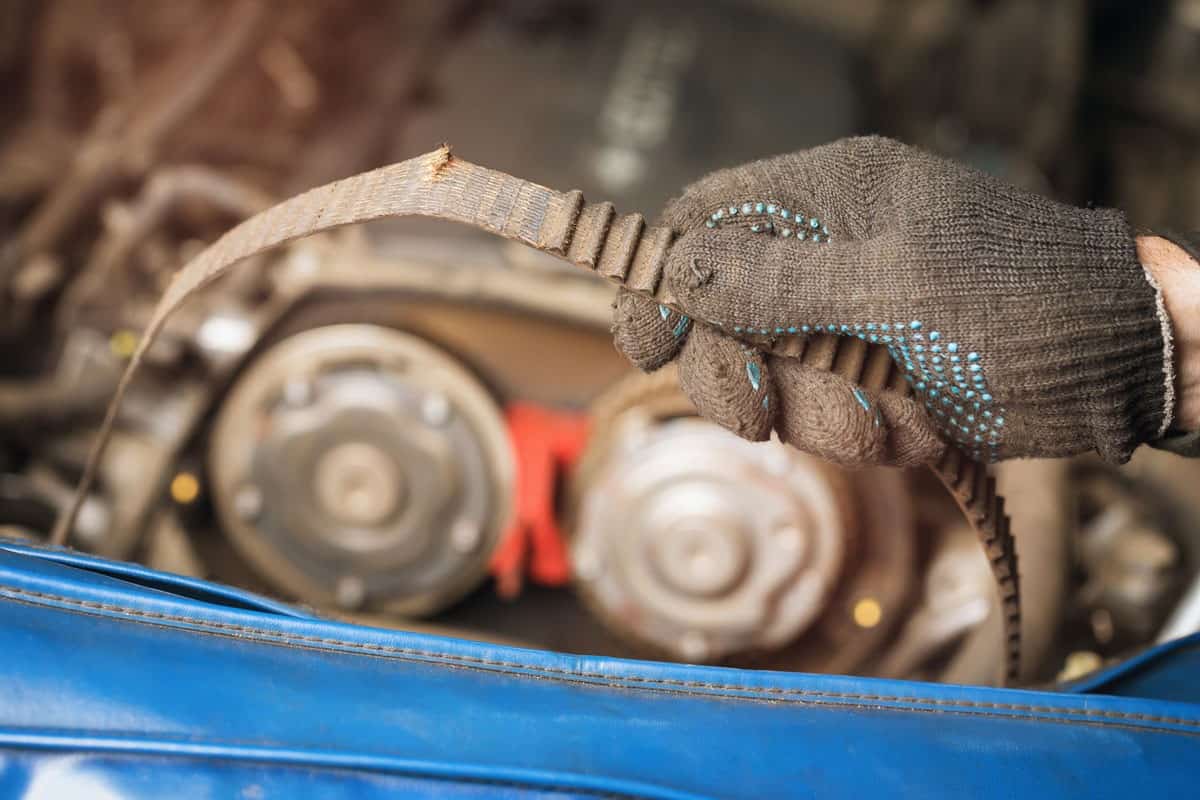
Even if you don’t notice squealing symptoms, you should routinely inspect your serpentine belt for signs of wear and tear.
After opening the hood, take a close look at the grooves of your serpentine belt. If the grooves are quite deep, then you know your belt is getting old. You should also feel your serpentine belt for any apparent signs of wear and tear or greasy surfaces.
There are now many diagnostic tools you could use to get a better sense of your serpentine belt’s health. For instance, you can now find comb-like “Belt Wear Gauges” that can measure the depth of your serpentine belt’s grooves. If you notice any wiggle room or light passing through these gauges, then you know your belt’s grooves are getting worn.
Be sure to check out this Dayco Belt Diagnostic Kit on Amazon which includes wear gauges, a tensioner gauge, and an alignment tool.
Can I Put WD-40 On A Squeaky Belt?
No, you should never put WD-40 on a squeaky belt. The reason professional mechanics don’t mention this “trick” is because WD-40 causes damage to rubber products. Plus, adding a spray of WD-40 can never fix the root cause of your squealing belt.
There are, however, a few valid uses for WD-40 when maintaining your car. For instance, you can read our blog posts on how to remove bird poop, tree sap, and bugs to find out how you could put your can of WD-40 to good use.
Keep Your Serpentine Belts Squeak-less!
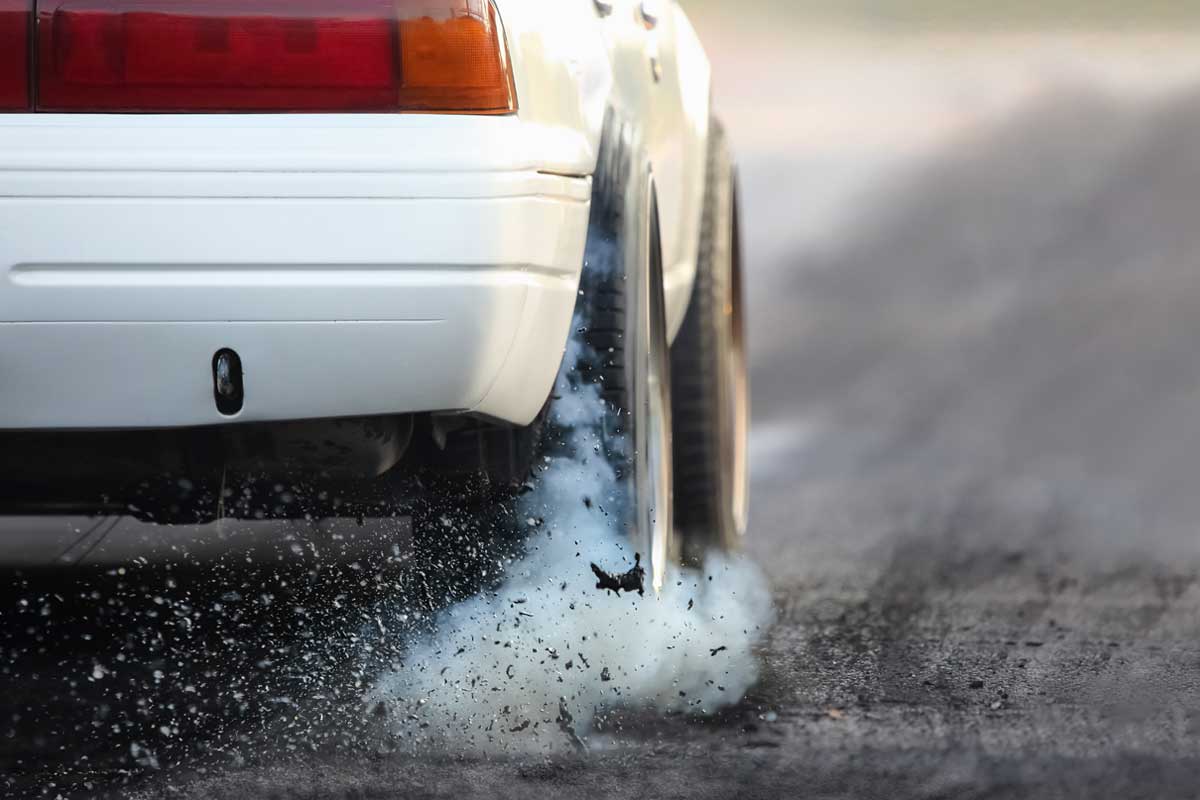
As you can see, a squealing sound is usually a sign that not all is right with your serpentine belt. We strongly encourage you to visit a professional mechanic as soon as you notice this noise.
Even if you don’t notice any issues with your serpentine belt, it’s a good idea to have a mechanic routinely check it for wear and tear. As your car reaches the 70,000 – 80,000-mile mark, you might want to consider getting a serpentine belt replacement.


